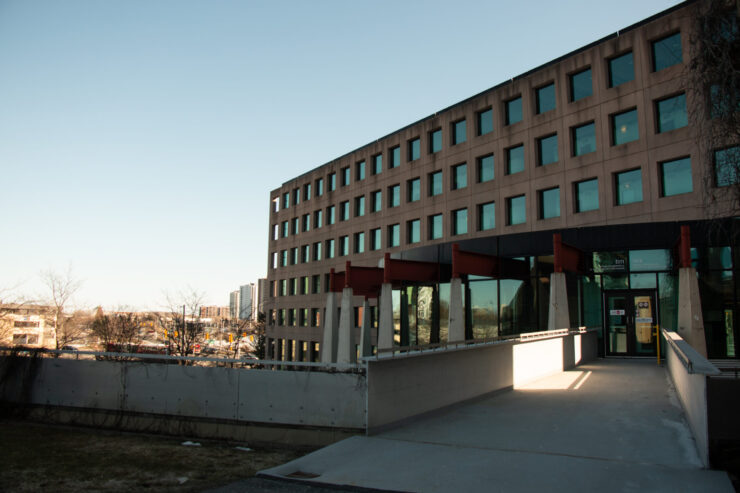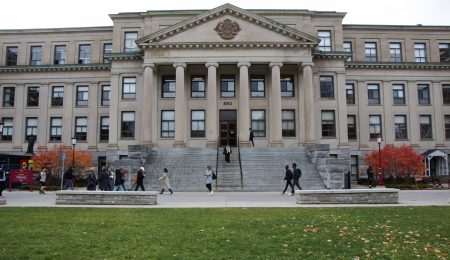The Fulcrum shines a spotlight on Emma Ballantyne
The University of Ottawa and the University of Ottawa Students’ Union (UOSU) are currently holding elections for four different elected student bodies. This article will look at the races taking place for the faculty of engineering for the UOSU Board of Directors (BOD).
UOSU’s BOD has a varying number of student representatives from each faculty who convene monthly to guide the work of UOSU as an organization. The number of representatives per faculty is dependent on the size of each faculty. The positions are unpaid and the main role of the BOD is to vote on motions put forward by the UOSU and be members of a number of union subcommittees.
The faculty of engineering has one candidate for three available seats: Emma Ballantyne. The sole faculty of engineering candidate for the Ottawa Senate did not respond to the Fulcrum’s request for an interview.
For those who wish to get familiar with Ballantyne, here is the transcription of the interviews done with the Fulcrum. All answers have been edited for length and clarity.
The Fulcrum: Can you introduce yourself in two to three sentences?
Emma Ballantyne: I am a second-year biomedical mechanical engineering student in the co-op program. I speak both English and French, although I am studying in English at the university.
F: Can you talk about previous involvements in student life on campus or relevant experiences that would help you in this role?
EB: I have been involved for the past year with the Engineering Student Society [ESS] conference selection committee, as a member of that. I’ve also participated throughout my first year and second year in a lot of the events from different student societies to kind of get a feel of how everything is run. I’ve also been involved with the uOconnection program as an upper year student helping international students adjust to life in Ottawa.
F: Can you explain the mandate for an engineering student elected to the BOD?
EB: My understanding of the role is that the board has monthly meetings to go over the financial responsibilities of the union and divide up the money that we have to best support all the different services that are run. As a director, I should be making sure that I am representing my faculty and voicing their concerns and opinions.
F: How do you plan on building on the work of your predecessors?
EB: I think that the past BOD has done a great job and all the students there, but it’s always good to have some new faces and new opinions. So just making sure that whatever comes up in the meetings, I am sure to incorporate what I hear from other people in my faculty, and make sure that their voices are heard, to make sure that we can continue to have change within the University of Ottawa Students’ Union, as things can always improve.
F: What’s one thing that often gets overlooked for your faculty?
EB: For the faculty of engineering, one thing that I feel gets overlooked a bit is, as a female in STEM, specifically engineering, I think it’s important that we have diversity in our representation. So, being a female who is representing the faculty of engineering, clearly it is a very male dominated faculty, so I think that’s an important thing that our voices are also heard, and that we are also represented within our faculty, even if we might not have as big of a population within it.
F: How do you intend to facilitate communication between students, the BOD and the Executive Committee?
EB: Making sure that all of the students in the faculty are heard means that I will always be available. Whether through email or Instagram or Facebook to be reached out to and making sure that everyone knows that, and always responding and hearing people out whenever they need to talk about anything or voice concerns. Then making sure while I’m listening to the students, I also bring those concerns and ideas up within the board meetings and to the Executives they may concern. [Just] making sure that if someone does bring something up to me, I do move forward and bring it up to the people that will be able to make the most of an impact with that information.
F: Are there any committees you plan on joining, and why?
EB: I haven’t, to date, decided on any committees that I’ll be joining — I want to hear a little bit more about them. Once I would be entering the role, and then once I have a more detailed overview, I would be able to decide which committees I think I would help the most based on my experiences and then also be able to learn new things. But I haven’t made any decisions yet.
F: What is one thing you think the BOD can improve on and how do you plan on helping to improve it?
EB: I think that will [be] based on the state of the world at the moment and all of the changes that are happening, it’s important to make sure that all the opinions of the students on how they think would improve their university experience are heard. [These are], obviously, unprecedented times as we hear that. So although we do try to keep communication open through the [UOSU] in the past, I think it’s important to make sure that, especially since we’re not in person at the moment, we continue to have those communication networks, open to be able to adapt and make the best experience for the students overall.
F: Why should students vote for you?
EB: I think students should vote for me because based on my experience with ESS and also being involved in various other things within the university that I would be a good person to represent the students as a way to keep communication open and ensure that everyone’s voices are being heard. I mean, I am also the only one running for this position. Right. I would really hope that I get at least seven votes, that would be great.





